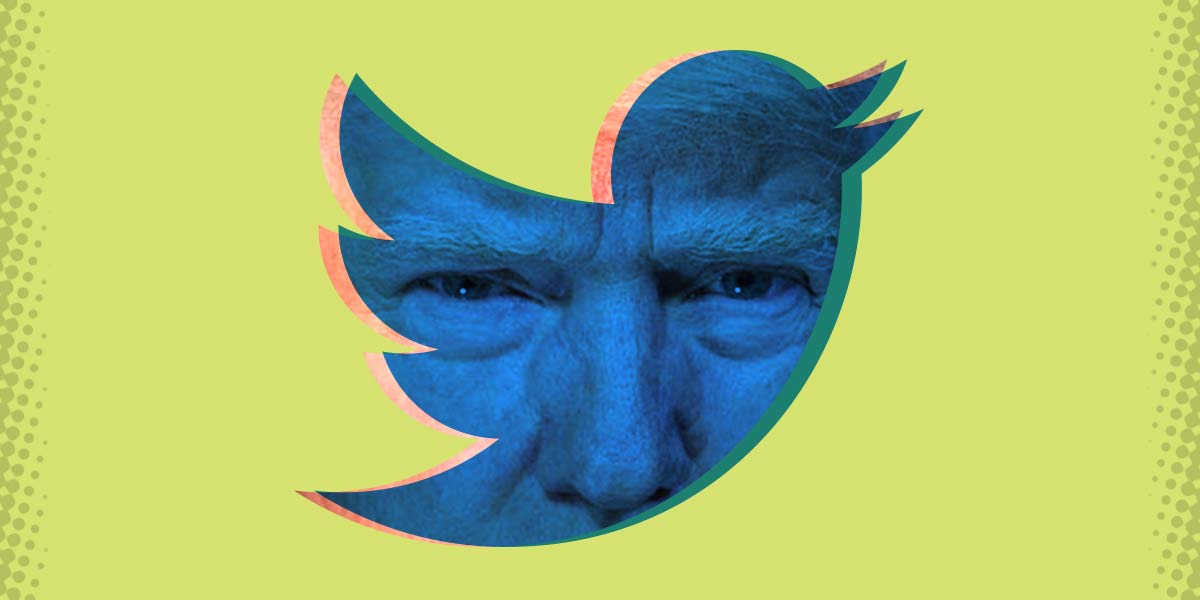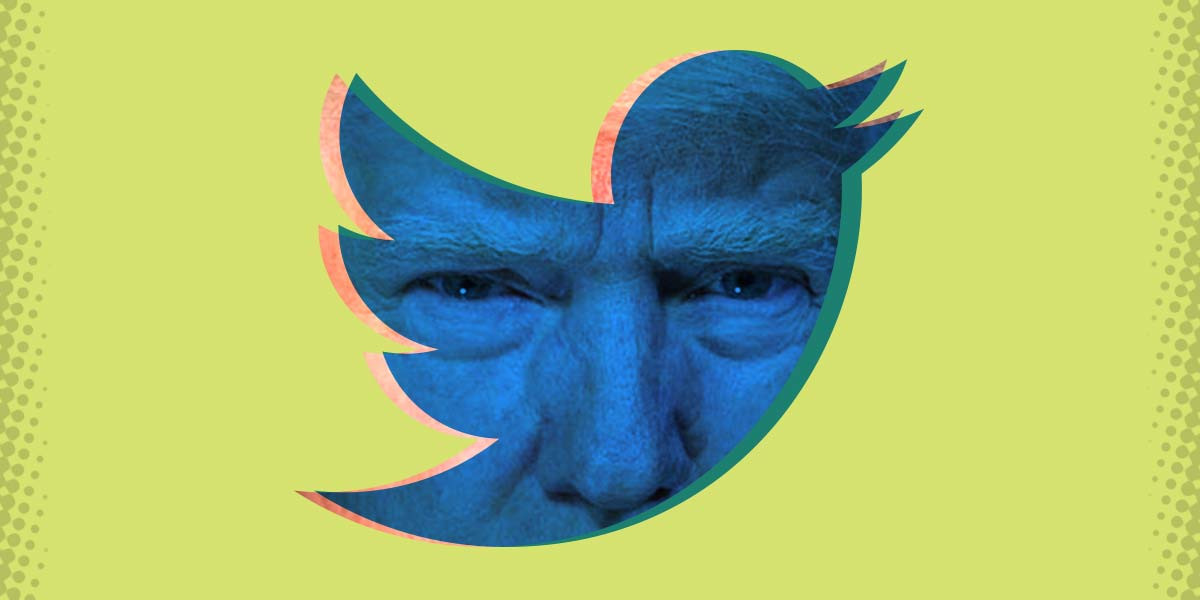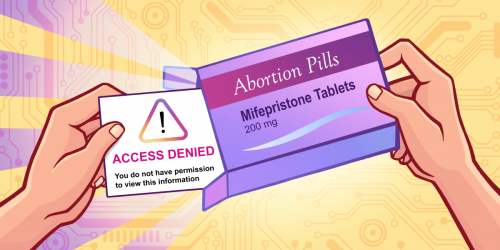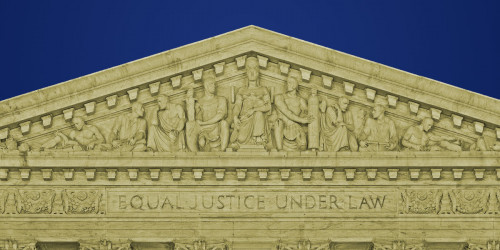We’ve taken a stand for the First Amendment rights of individuals to receive and comment on social media posts from governmental officials and agencies. We’ve received a lot of good questions about why we believe that public servants—mayors, sheriffs, senators, even President Donald Trump—can’t block people whose views they dislike on Twitter without violating those persons’ free speech rights. Some question why citizens have a right to receive an official’s private Twitter account—@realdonaldtrump, for example. Others point out that Twitter isn’t a government forum with an obligation to allow users access to Trump’s messages, and others say users can still use workarounds to see the tweets of those who have blocked them.
We’re taking a deep dive into the First Amendment here to explain our thinking and our reading of the law that supports our position. As you read, bear this in mind: the First Amendment doesn’t just protect your right to speak your mind. It also protects your right to receive, read, hear, see, and obtain information and ideas.
We filed a “friend of the court” brief in a lawsuit brought by the Knight First Amendment Institute and several Twitter users who have been blocked by President Trump from the @realdonaldtrump account. The president has admitted in the lawsuit that he blocked them because he objected to the viewpoints they expressed in replying to his tweets or in their own tweets. The lawsuit names President Trump, acting White House communications director Hope Hicks, White House press secretary Sarah Huckabee Sanders, and Daniel Scavino, White House deputy director of social media, as defendants. The case is Knight First Amendment Institute v. Trump.
The government was not allowed to pick and choose who gets to receive official statements in the predigital age, and that’s still true in the digital age when public servants are increasingly relying on social media to communicate with the public
Although that case is specifically about President Trump’s Twitter feed, we see this as a much broader issue. We frequently receive reports from community activists and other social media users who were blocked from commenting on an agency’s Facebook page, or prevented from contributing to a community discussion prompted by an officials’ tweet, or have faced similar barriers to participation in public debate. We receive reports about how governmental officials manipulate social media comments to exclude opposing views to create the impression that hotly contested policies are not contested at all. And we realize, in seeing how agencies use social media to quickly disseminate emergency information during the recent spate of natural disasters, that the ability to receive such messages can be a matter of life and death.
The main focus of our brief was thus to detail for the court how governments all across the country and at every level—city, county, state, and federal—use social media platforms like Twitter, Facebook, and Instagram to communicate with the public about the business of government. These same platforms allow members of the public to communicate back to them and with each other. Governmental use of social media is commonplace and pervasive, and lawmakers view social media as vital to their work.
As we wrote in the brief:
In a survey of members of Congress and their staff, the Congressional Management Foundation found that 76% of respondents felt that social media enabled more meaningful interactions with constituents; 70% found that social media made them more accountable to their constituents; and 71% said that constituent comments directed to the representative on social media would influence an undecided lawmaker. Congressional Management Foundation, #SocialCongress2015, (2015)
. . . .
State legislatures also extend public debate in their chambers to social media forums so that they are more visible by the public, specifically their constituents. In New York, debates over funding and employee salaries between the legislature and the governor’s office took place on Twitter. In Maryland, legislators debated the benefits of state legislation versus county regulations. And in Georgia, Representatives engaged in heated debate over the removal of confederate monuments.
We also provided examples of how during the hurricanes in Houston, Florida, and Puerto Rico, and the firestorms in Sonoma and Napa, officials used social media to quickly disseminate evacuation orders, safe travel routes, and forecasts to the public.
When elected officials choose to give speeches in a park, hold town hall meetings in a school stadium, or tweet out safety instructions to flood victims, the public’s First Amendment rights to receive those messages are triggered
You have a right to receive and read government communications sent via social media
When governmental officials and agencies choose a particular technique or technology to communicate with the public about governmental affairs—programs, policies, services, opinions, and safety measures—they have endowed the public with First Amendment rights to receive those messages. And this right is infringed when government denies access to these messages because it disagrees with someone’s viewpoints.
The principal of having First Amendment rights to receive government communications has nothing to do with Twitter or Facebook. The medium of communication, whether it’s online, television, radio, print, or bullhorn—isn’t the issue. When elected officials choose to give speeches in a park, hold town hall meetings in a school stadium, stand on a street corner giving safety instructions to flood victims, or debate each other on Twitter, the public’s First Amendment rights to receive those messages are triggered.
Prior to social media, officials couldn’t block their critics from receiving official governmental communications. When the president could only use radio and television to communicate with the public, he could not compel broadcasters to exclude certain neighborhoods from access to the broadcasts because residents in that area had protested against him. If a mayor delivered an official proclamation in a park, be it public or private, he could not have guards check each listener against a list of people who had written a letter to the editor criticizing them, and block letter writers from the event. In the digital age, the White House can’t block access to a press release on its website from certain ISP addresses because they belong to people who had criticized the president.
There’s a well-developed body of law supporting these First Amendment rights that arose in the pre-social media context and logically applies to social media as well. Before social media, most individuals received official governmental communications through the news media. Newspapers would receive and republish press releases and send reporters to attend and report on press conferences. TV and radio news outlets would do the same, and also broadcast video or audio from such events. The Supreme Court has called this the press’s “surrogate” role—that is, the press standing in for the populace-at-large that cannot attend such events in person or receive communications directly. When officials or agencies tried to block media outlets from covering official events, which were otherwise generally open to the press, the news media would challenge those blocks in court and most commonly get favorable results. So, for example, the Mayor of Honolulu was not permitted to exclude a reporter, whom the mayor found was “irresponsible, inaccurate, biased, and malicious” in his reporting, from an otherwise open press conference. And a district attorney could not require reporters from a certain newspaper to make appointments to interview officials, while he made them available without appointments to all other media. And two mayoral campaigns were not permitted to exclude ABC from their election night rallies that were open to other news media. These are just a few examples where courts found that officials could not make it more difficult for disfavored news media to get official information than other news media.
This law must apply to governmental communications through social media, in which messages go directly to the public and news media surrogates are not needed. Agencies and officials rely on social media to communicate with the public, and can’t pick and choose who gets to receive their messages, like they couldn’t pick and choose which news media can cover their press conferences. The fact that social media makes it really easy for a governmental official tweeting about governmental business to block a critic, doesn’t make it constitutional to do so.
The fact that social media makes it really easy for a government official tweeting about government business to block a critic, doesn’t make it constitutional to do so
We think this only makes sense. Public officials must not have the ability to block individuals whose viewpoints they dislike from receiving evacuation orders, or make it more difficult for them to view public conversations about how government operates, how policies are made, and what services are offered. That’s exactly the kind of viewpoint discrimination the First Amendment forbids.
You have a right to comment in government’s social media posts
Blocking infringes First Amendment rights in another way as well—by preventing an individual from adding to the public conversation, replying to or commenting upon an officials’ social media post, and preventing them from communicating with governmental officials directly by way of tagging.
Officials at all levels of government, like the mayors of Boston and Cleveland, use social media to hold “virtual town halls,” creating a space for the public to comment on specific projects or public affairs in general. A tweet from a governmental official can lead to a discussion among constituents debating the merits of a policy announcement. Anyone can easily see the same in the comments posted to agency Facebook pages. Social media sites in this way have become important places for democratic engagement and debate. We cited these and other examples in our brief to show that those who are blocked are excluded from speaking in these discussions.
In creating social media accounts with these communication features, like a Facebook page with a comments section, or a Twitter account that permits tagging and replies, the government endows the public with First Amendment rights to speak in these forums.
The First Amendment forbids viewpoint-based speech restrictions like those that result from blocking. The legal doctrine that applies here is the same one that is used to determine the government’s ability to regulate speech in government-controlled places or programs—the Forum Doctrine.
Essentially, government-controlled forums for speech are divided into three categories: public forums which are created or historically used (like parks or streets) for the purpose of allowing private speakers to freely converse; non-public forums in which some private speaking is occasionally permitted even though the forum is not generally open for private speakers; and non-forums, more commonly known as “government speech,” because there are in actuality no private speakers at all; the government is the only speaker even though the government sometimes enlists or employs private people to speak for it.
The president’s tweets are official statements—as his press secretary said in June and Justice Department lawyers told a judge on Nov. 14–and the public has a First Amendment right to receive them
Think of a bulletin board in a public library. The board that’s open to anyone to post anything—help-wanted ads, books to trade, meetings, etc.—is akin to a public forum. A bulletin board that’s mostly for the library’s own messages—hours of operations, library events, librarian recommendations—but the library occasionally, in its discretion, allows posting of some private messages, is a non-public forum. The last board is one that’s only for the library’s messages. That’s a non-forum. (There’s also a category that’s in between public and non-public forums: limited public forums. In limited public forums, the government opens the forum only for a specific category of content, for example, a library bulletin board reserved only for private messages about book groups. Limited public forums operate like public forums when the speech is of specified subject matter, but operate like non-public forums with respect to all other content.)
The level of control over speech the government may exercise varies with the forum:
• Generally, in public forums, the government may not limit the content or viewpoint of private speech. It may only reasonably limit the time, place, and manner of private speech in a way that preserves alternative methods for private speech. So, in our library example, the library could generally limit the size of all notes posted and the length of time they can remain on the board. But it could not block a notice about a dance party or one that criticized the library for not having longer hours. In limited public forums, the government can enforce its subject matter limitation, as long as reasonable in light of the purposes of the forum, but cannot discriminate against viewpoints regarding that subject matter—so it could limit the board to reading recommendations, but it could not exclude recommendations it disagrees with;
• In non-public forums, the government may limit the content of permissible private speech, but may not prohibit speech because it disagrees with the viewpoints expressed. So even if it occasionally, but not as a rule, allows an individual to post a book recommendation, it can’t deny an individual the right to post a recommendation it disagrees with;
• And in the non-forum, the government can limit both content and viewpoint. Everything that’s posted is the library’s own speech, including any private speech the government may adopt and endorse as its own.
Exactly which kind of forum (or non-forum) is created by a governmental social media account depends on the particular way the government operates it. An official could allow individuals to post comments on an agency Facebook page about anything. This will likely be a public forum. The official could open up the comments only about a specific agency proposal. This would be a limited public forum. An agency could as a rule exclude comments, making only the occasional exception—that’s a non-public forum. When an agency that makes all the comments itself, that’s government speech—the non-forum.
From what we have seen, social media accounts commonly function as public forums where anyone can speak—like a gathering spot in a park, or a street corner where a crowd has formed. As we wrote in the brief:
It is clear then that in practice, social media platforms like Twitter that allow for the general public to comment upon governmental posts, or communicate directly with officials, agencies, or to otherwise participate in a publicly viewable debate, function like the paradigmatic speakers’ corner in a public park. See Perry, 460 U.S. at 45 (identifying streets and parks as “quintessential public forums” for “assembly, communicating thoughts between citizens, and discussing public questions”). Indeed, governmental social media accounts probably host these functions more than parks and streets currently do. As the Supreme Court recognized just last term, “While in the past there may have been difficulty in identifying the most important places (in a spatial sense) for the exchange of views, today the answer is clear. It is cyberspace—the ‘vast democratic forums of the Internet’ in general, Reno v. American Civil Liberties Union, 521 U.S. 844, 868 (1977), and social media in particular.” Packingham, 137 S. Ct. at 1735 (included citation abbreviated) (explaining that a denial of access to social media was a significant abridgement of First Amendment rights given modern civic and social communication).
In Knight First Amendment Institute v. Trump, we agree with the plaintiffs that @realdonaldtrump is operated like a public forum. The account permits tagging and replies and the reply feed and tagging functions are generally open to all. At any hour of the day or night you can view replies to the tweets that are full of praise or deeply critical. Viewpoint discrimination in such public forums plainly violates the First Amendment.
But, importantly, because the president admits to viewpoint discrimination, it doesn’t really matter if his Twitter account is a public or non-public forum. Viewpoint discrimination is only tolerated in non-forums, where the government is the only speaker. Clearly that’s not the case for @therealdonaldtrump.
But Twitter is a private platform that maintains some ability to block users itself. How can an official like Trump be restricted by the First Amendment from blocking people when Twitter itself can shut out users?
It’s the president’s (and other officials’) use of Twitter that is subject to the First Amendment, not Twitter itself. So even if the social media platforms themselves make their own rules about who gets an account and what kind of speech is allowed, public agencies and officials can't use the tools those platforms provide users to block followers on the basis of viewpoint.
Courts have ruled in similar contexts that it's unconstitutional for the government to use communication platforms, even private ones, for government business in ways that censor speech and prevents it from reaching the public.
In one such case, a theatrical production company asked to use a privately-owned auditorium in Chattanooga under long-term lease with the city to present the musical "Hair," a controversial play that featured nudity and obscene language. The Supreme Court ruled that the city's decision to reject the theater company's request violated the First Amendment. It didn’t matter that the theater owner retained some control over the use of the theater. The city could not use the exclusionary power granted to it under the lease in an unconstitutional way.
In another case, television reporters from one network were barred, under threat of arrest, from covering live the post-election activities of candidates running for mayor of New York City. The venues for these events were privately owned and operated. Nevertheless, a federal appeals court ruled that once the press is generally invited, "there is a dedication of those premises to public communications use." The court rejected the notion that the candidates could decide to exclude one network over others, saying "the danger would be that those of the media who are in opposition or who the candidate thinks are not treating him fairly would be excluded."
In both these cases, as here with Twitter, the venues and platforms used by government to communicate official business were private, with their own rules and operations. When officials use them for official business, they can’t under the First Amendment limit or block access to these spaces on the basis of viewpoint.
This rule must apply whether the space is physical or digital.
But @realdonaldtrump is his personal account! Shouldn’t these rules only apply to the official @POTUS account?
We heard a few comments like this. To us, the important thing is that the platform, whether through an official or personal account, is being used to conduct the government’s business. The president’s tweets are official statements—as his press secretary said in June and Justice Department lawyers told a judge on Nov. 14–and the public has a First Amendment right to receive them.
We’ve taken a similar position in other situations where private accounts were used to conduct government business.
For example, we have argued that governmental officials emails that are sent or received as part of the official’s governmental duties are public records, even if the official uses a private email account. As we pointed out in our brief, courts that have considered the issue have agreed.
Does this mean I can't block anyone?
A non-governmental actor can block anyone they want without violating the First Amendment. The First Amendment only restricts the government’s ability to limit speech in this context.
But how are anyone’s rights violated if users can view the president’s tweets even if they are blocked from getting them in their own feeds?
It's unconstitutional for the government to make it more difficult to receive information or speak. Users can’t be required to find workarounds to exercise their fundamental civil liberties.
The government was not allowed to pick and choose who gets to receive official statements in the predigital age, and that’s still true in the digital age when public servants are increasingly relying on social media to communicate with the public. That’s why we asked the court to recognize that government officials, even the president, who use the power of social media to create a forum for individuals to communicate with him and to each other, must respect the public’s First Amendment right to receive and comment on, whether negatively or positively, their statements.











